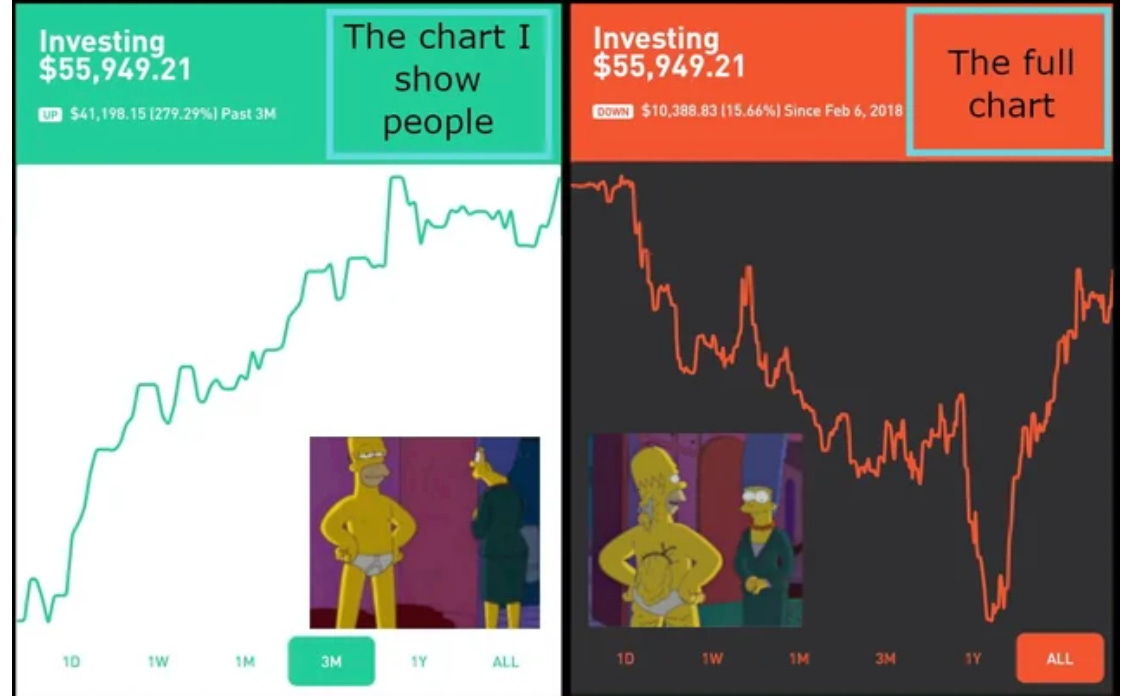ogc163
Superstar
It is because you don't know the end and purpose of things that you think the wicked and the criminal have power and happiness.” — Boethius, On the Consolation of Philosophy
Nobody has a precise idea how much wealth anyone else has. There is a good chance that you don’t even know your own. We are all engaged in an elaborate game of assumptions, even about our own future.
The fact that men are posting gain and loss porn on Reddit is not a sign of transparency, but opacity. The narratives only go skin deep.

Beneath the narratives, people are silently crying out for order—a link between cause and effect, or some indication that hard work still matters, or the assurance that they will be rewarded for good decisions and not for reckless ones.
When you make and/or lose a lot of money quickly, without the ability to see exactly why and how the windfall or bust happened, it can lead to financial nihilism. When you see—or think you see—other people doing the same, it can lead to financial nihilism. When you work very hard and do All the Right Things (as Dave Ramsey, or some other financial guru, would have you do) and then proceed to lose most of your net worth in the course of a month due to unexpected circumstances, it can lead to financial nihilism.
There are a few different ways of defining this particular form of nihilism. Each of them points to a different aspect of it.
My friend Demetri Kofinas has referred to financial nihilism as “a philosophy that treats the objects of speculation as though they were intrinsically worthless.” It is a philosophy that fully embraces the view that reality is completely subjective. I should note that the Subjective Theory of Value in economics does not, in any way, imply that reality itself is subjective—but rather that subjects determine the value of an object, and ultimately its price, through their collective decisions. Each of these actors could be acting with a greater or lesser vision of and adherence to reality. But for the financial nihilist, the subjective completely subsumes the objective. The truth is that both exist. For example: beauty, at least classically understood, is objective—it has certain characteristics, like claritas (clarity), consonantia (proportion), integritas (integrity/coherence)—but I perceive it subjectively. Conflating the two leads to problems.
Financial nihilism is usually downstream from ontological nihilism. I don’t think people are nihilistic in a domain-specific sense; I believe that nihilism is diffusive and easily bleeds over into all aspects of life, from relationships to one’s health. (For instance: you hear about a friend who takes extremely good care of himself but is nevertheless unexpectedly diagnosed with cancer, and so you think: ‘screw it, what’s the use of this discipline?’). We have entered a truly nihilistic age, which is reflected in our politics as much if not more than our markets. It’s as if it doesn’t actually matter what people say or do anymore. This spirit of political nihilism was summed up by Donald Trump saying “I could stand in the middle of Fifth Avenue and shoot somebody, and I wouldn't lose any voters, OK? It's, like, incredible." Yes, it is incredible. And that’s why politics is no longer credible. Nihilism, like all of life, ultimately comes down to the fundamental question of belief. People don’t know who they can trust or who they can believe in, but they must believe in something.
There is a time-bound aspect to financial nihilism. If in one second you can lose or make a lot of money in a manner that feels completely detached from any amount of “value” that you believe you created (the idea that all people who have money must have created a ton of “value” is problematic, because most people don’t understand what value means in this specific case—which is subjective value), then you begin to get the sense that the quality of your work has no connection to what people will pay for it, or to financial success. Not even your intelligence can save you. You can analyze a single stock for six months (as one long-only hedge fund manager told me) and buy it with a complete conviction that it’s undervalued, and then watch as it loses 80% in the course of a single year. If the bears are making money based purely on mimesis and momentum, what’s the use of pouring yourself out doing analysis for 40+ hours? Eventually, you come to place here you simply wait, second by second, to see if anything changes. Having lost a firm belief in your own agency, you place bets, you wait, you see what happens. If nothing matters, then what good is there in being good? Abandonment to non-divine providence is the only thing left.
If you’re unable to transcend the transactional—to exit the logic of the game (the gamification of the stock market, the NFT swindles, the latest crypto narrative)—you simply enter deeply into it for fear of being left out or left behind. The small amount of nihilism that led to your decision to play breeds more nihilism once you’re deep inside of the game. Now, in the moment, you may feel that you truly believe in the game, but you don’t really. You can’t even be an honest nihilist because you have had to make friends with dishonest wealth.
Lastly, a financial nihilist can be described as someone who has no skin in the game.
Nobody has a precise idea how much wealth anyone else has. There is a good chance that you don’t even know your own. We are all engaged in an elaborate game of assumptions, even about our own future.
The fact that men are posting gain and loss porn on Reddit is not a sign of transparency, but opacity. The narratives only go skin deep.

Beneath the narratives, people are silently crying out for order—a link between cause and effect, or some indication that hard work still matters, or the assurance that they will be rewarded for good decisions and not for reckless ones.
When you make and/or lose a lot of money quickly, without the ability to see exactly why and how the windfall or bust happened, it can lead to financial nihilism. When you see—or think you see—other people doing the same, it can lead to financial nihilism. When you work very hard and do All the Right Things (as Dave Ramsey, or some other financial guru, would have you do) and then proceed to lose most of your net worth in the course of a month due to unexpected circumstances, it can lead to financial nihilism.
There are a few different ways of defining this particular form of nihilism. Each of them points to a different aspect of it.
My friend Demetri Kofinas has referred to financial nihilism as “a philosophy that treats the objects of speculation as though they were intrinsically worthless.” It is a philosophy that fully embraces the view that reality is completely subjective. I should note that the Subjective Theory of Value in economics does not, in any way, imply that reality itself is subjective—but rather that subjects determine the value of an object, and ultimately its price, through their collective decisions. Each of these actors could be acting with a greater or lesser vision of and adherence to reality. But for the financial nihilist, the subjective completely subsumes the objective. The truth is that both exist. For example: beauty, at least classically understood, is objective—it has certain characteristics, like claritas (clarity), consonantia (proportion), integritas (integrity/coherence)—but I perceive it subjectively. Conflating the two leads to problems.
Financial nihilism is usually downstream from ontological nihilism. I don’t think people are nihilistic in a domain-specific sense; I believe that nihilism is diffusive and easily bleeds over into all aspects of life, from relationships to one’s health. (For instance: you hear about a friend who takes extremely good care of himself but is nevertheless unexpectedly diagnosed with cancer, and so you think: ‘screw it, what’s the use of this discipline?’). We have entered a truly nihilistic age, which is reflected in our politics as much if not more than our markets. It’s as if it doesn’t actually matter what people say or do anymore. This spirit of political nihilism was summed up by Donald Trump saying “I could stand in the middle of Fifth Avenue and shoot somebody, and I wouldn't lose any voters, OK? It's, like, incredible." Yes, it is incredible. And that’s why politics is no longer credible. Nihilism, like all of life, ultimately comes down to the fundamental question of belief. People don’t know who they can trust or who they can believe in, but they must believe in something.
There is a time-bound aspect to financial nihilism. If in one second you can lose or make a lot of money in a manner that feels completely detached from any amount of “value” that you believe you created (the idea that all people who have money must have created a ton of “value” is problematic, because most people don’t understand what value means in this specific case—which is subjective value), then you begin to get the sense that the quality of your work has no connection to what people will pay for it, or to financial success. Not even your intelligence can save you. You can analyze a single stock for six months (as one long-only hedge fund manager told me) and buy it with a complete conviction that it’s undervalued, and then watch as it loses 80% in the course of a single year. If the bears are making money based purely on mimesis and momentum, what’s the use of pouring yourself out doing analysis for 40+ hours? Eventually, you come to place here you simply wait, second by second, to see if anything changes. Having lost a firm belief in your own agency, you place bets, you wait, you see what happens. If nothing matters, then what good is there in being good? Abandonment to non-divine providence is the only thing left.
If you’re unable to transcend the transactional—to exit the logic of the game (the gamification of the stock market, the NFT swindles, the latest crypto narrative)—you simply enter deeply into it for fear of being left out or left behind. The small amount of nihilism that led to your decision to play breeds more nihilism once you’re deep inside of the game. Now, in the moment, you may feel that you truly believe in the game, but you don’t really. You can’t even be an honest nihilist because you have had to make friends with dishonest wealth.
Lastly, a financial nihilist can be described as someone who has no skin in the game.
